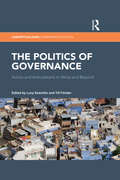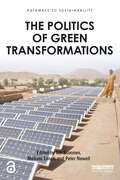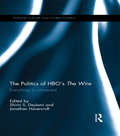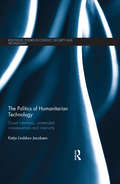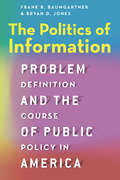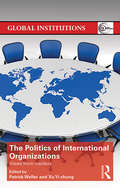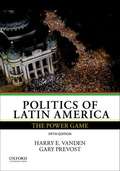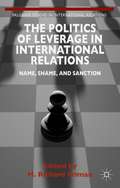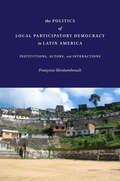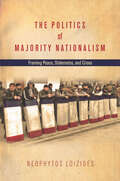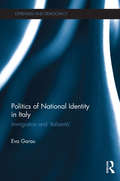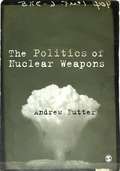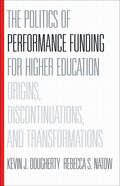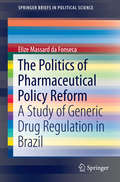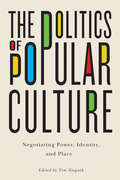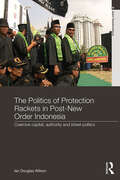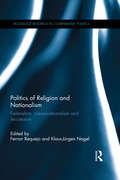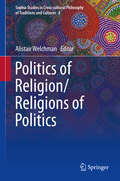- Table View
- List View
The Politics of Gay Marriage in Latin America: Argentina, Chile, and Mexico
by Jordi DíezAddressing one of the defining social issues of our time, The Politics of Gay Marriage in Latin America explores how and why Latin America, a culturally Catholic and historically conservative region, has become a leader among nations of the Global South, and even the Global North, in the passage of gay marriage legislation. In the first comparative study of its kind, Jordi Díez explains cross-national variation in the enactment of gay marriage in three countries: Argentina, Chile, and Mexico. Based on extensive interviews in the three countries, Díez argues that three main key factors explain variation in policy outcomes across these cases: the strength of social movement networks forged by activists in favor of gay marriage; the access to policy making afforded by particular national political institutions; and the resonance of the frames used to demand the expansion of marriage rights to same-sex couples. Makes a significant theoretical contribution by combining two approaches in the social sciences that are engaged separately: social movements and public policy. The first book to examine cross-national variation in the expansion of gay marriage in Latin America. The only volume to provide a historical comparative and systematic account of three gay and lesbian movements in Latin America.
The Politics of Governance: Actors and Articulations in Africa and Beyond (Conceptualising Comparative Politics)
by Lucy Koechlin Till FörsterHow do government arrangements emerge? When and how does individual agency turn into collective agency? How do sensory experiences of violence, instability, etc affect the configuration of governance arrangements? When, why, and how are governance arrangements institutionalized? This book seeks to contribute to a non-normative conceptualization of the emergence and transformation of government arrangements, and addresses the under-theorization of actors and agency in conventional governance theories. The editors and contributors theorize the concept of governance more concretely by analyzing the key actors and arrangements that define states of governance across different places and by examining its performance and development in particular settings and time periods. Each contribution to the edited volume is based on a case-study drawn from Africa, though the book argues that the core issues identified remain the same across the world, though in different empirical contexts. The contributions also range across key disciplines, from anthropology to sociology to political science. This ground-breaking volume addresses governance arrangements, discusses how social actors form such arrangements, and concludes by synthesizing an actor-centered understanding of political articulation to a general theory of governance. Scholars across disciplines such as political science, development studies, African studies, and sociology will find the book insightful.
The Politics of Green Transformations (Pathways to Sustainability)
by Peter Newell Ian Scoones Melissa LeachMultiple ‘green transformations’ are required if humanity is to live sustainably on planet Earth. Recalling past transformations, this book examines what makes the current challenge different, and especially urgent. It examines how green transformations must take place in the context of the particular moments of capitalist development, and in relation to particular alliances. The role of the state is emphasised, both in terms of the type of incentives required to make green transformations politically feasible and the way states must take a developmental role in financing innovation and technology for green transformations. The book also highlights the role of citizens, as innovators, entrepreneurs, green consumers and members of social movements. Green transformations must be both ‘top-down’, involving elite alliances between states and business, but also ‘bottom up’, pushed by grassroots innovators and entrepreneurs, and part of wider mobilisations among civil society. The chapters in the book draw on international examples to emphasise how contexts matter in shaping pathways to sustainability Written by experts in the field, this book will be of great interest to researchers and students in environmental studies, international relations, political science, development studies, geography and anthropology, as well as policymakers and practitioners concerned with sustainability.
The Politics of HBO's The Wire: Everything is Connected (Popular Culture and World Politics)
by Jonathan Havercroft Shirin DeylamiThis innovative new work suggests that The Wire reflects, not simply a cultural take on contemporary America, but a structural critique of the conditions of late-modernity and global capitalism. As such, it is a visual text worth investigating and exploring for its nuanced examination of power, difference and inequality. Deylami & Havercroft bring together nine essays addressing issues of interest to a range of academic fields in order to engage with this important cultural intervention that has transfixed audiences and sparked debate within the social scientific community. While the TV show is primarily focused upon the urban politics of Baltimore, the contributors to this volume read Baltimore as a global city. That is, they argue that the relations between race, class, power, and violence that the series examines only make sense if we understand that inner city Baltimore is a node in a larger global network of violence and economic inequality. The book is divided into three interrelated sections focusing on systemic and cultural violence, the rise and decline of national and state formations, and the dysfunctional and destructive forces of global capitalism. Throughout the series the relation of the urban to the global is constantly being explored. This innovative new volume explains clearly how The Wire portrays this interaction, and what this representation can show social scientists interested in race, neo-liberal processes of globalization, criminality, gender, violence and surveillance.
The Politics of Heritage in Africa
by Derek R. Peterson Kodzo Gavua Ciraj Rassool Derek R. Peterson Kodzo GavuaHeritage work has had a uniquely wide currency in Africa's politics. Secure within the pages of books, encoded in legal statutes, encased in glass display cases and enacted in the panoply of court ritual, the artefacts produced by the heritage domain have become a resource for government administration, a library for traditionalists and a marketable source of value for cultural entrepreneurs. The Politics of Heritage in Africa draws together disparate fields of study - history, archaeology, linguistics, the performing arts and cinema - to show how the lifeways of the past were made into capital, a store of authentic knowledge that political and cultural entrepreneurs could draw from. This book shows African heritage to be a mode of political organisation, a means by which the relics of the past are shored up, reconstructed and revalued as commodities, as tradition, as morality or as patrimony.
The Politics of Humanitarian Technology: Good Intentions, Unintended Consequences and Insecurity (Routledge Studies in Conflict, Security and Technology)
by Katja Lindskov JacobsenThis book offers a detailed exploration of three examples of humanitarian uses of new technology, employing key theoretical insights from Foucault. We are currently seeing a humanitarian turn to new digital technologies, such as biometrics, remote sensing, and surveillance drones. However, such humanitarian uses of new technology have not always produced beneficial results for those at the receiving end and have sometimes exposed the subjects of assistance to additional risks and insecurities. Engaging with key insights from the work of Foucault combined with selected concepts from the Science and Technology Studies literature, this book produces an analytical framework that opens up the analysis to details of power and control at the level of materiality that are often ignored in liberal histories of war and modernity. Whereas Foucault details the design of prisons, factories, schools, etc., this book is original in its use of his work, in that it uses these key insights about the details of power embedded in material design, but shifts the attention to the technologies and attending forms of power that have been experimented with in the three humanitarian endeavours presented in the book. In doing so, the book provides new information about aspects of liberal humanitarianism that contemporary critical analyses have largely neglected. This book will be of interest to students of humanitarian studies, peace and conflict studies, critical security studies, and IR in general.
The Politics of Information: Problem Definition and the Course of Public Policy in America
by Frank R. Baumgartner Bryan D. JonesHow does the government decide what’s a problem and what isn’t? And what are the consequences of that process? Like individuals, Congress is subject to the "paradox of search. ” If policy makers don’t look for problems, they won’t find those that need to be addressed. But if they carry out a thorough search, they will almost certainly find new problems--and with the definition of each new problem comes the possibility of creating a government program to address it. With The Politics of Attention, leading policy scholars Frank R. Baumgartner and Bryan D. Jones demonstrated the central role attention plays in how governments prioritize problems. Now, with The Politics of Information, they turn the focus to the problem-detection process itself, showing how the growth or contraction of government is closely related to how it searches for information and how, as an organization, it analyzes its findings. Better search processes that incorporate more diverse viewpoints lead to more intensive policymaking activity. Similarly, limiting search processes leads to declines in policy making. At the same time, the authors find little evidence that the factors usually thought to be responsible for government expansion--partisan control, changes in presidential leadership, and shifts in public opinion--can be systematically related to the patterns they observe. Drawing on data tracing the course of American public policy since World War II, Baumgartner and Jones once again deepen our understanding of the dynamics of American policy making.
The Politics of International Organizations: Views from insiders (Global Institutions)
by Patrick Weller Xu Yi-ChongInternational organisations (IOs) often receive a bad press, seen as intrusive, domineering and unresponsive to the needs of the people and countries they are meant to serve. The best way to understand the operation of these international organisations is to bring together those who represent their countries at IOs and those who have been working at IOs at various capacities and then to listen to their experiences. This book develops an alternative approach to the analysis of IOs that takes account of all those involved, whether state representatives, IO leaders and members of the secretariat. Experts with long experience in the WTO, the World Bank, the IMF, WIPO, the FAO and the WHO at senior level consider the workings of the IOs, and a conclusion that explicitly draws out the comparative lessons and contrasts the insights of practitioners from those of external observers. This book takes an alternative approach to the analysis of IOs that takes account of all those involved, whether state representatives, IO leaders and members of the secretariat. Providing a well-informed, innovative and consistently structured analysis of IOs this work will be of interest to students and scholars of international relations, international organizations and global governance.
The Politics of Judicial Independence in the UK’s Changing Constitution
by Gee, Graham and Hazell, Robert and Malleson, Kate and O’Brien, Patrick Graham Gee Robert Hazell Kate Malleson Patrick O’brienJudicial independence is generally understood as requiring that judges must be insulated from political life. The central claim of this work is that far from standing apart from the political realm, judicial independence is a product of it. It is defined and protected through interactions between judges and politicians. In short, judicial independence is a political achievement. This is the main conclusion of a three-year research project on the major changes introduced by the Constitutional Reform Act 2005, and the consequences for judicial independence and accountability. The authors interviewed over 150 judges, politicians, civil servants and practitioners to understand the day-to-day processes of negotiation and interaction between politicians and judges. They conclude that the greatest threat to judicial independence in future may lie not from politicians actively seeking to undermine the courts, but rather from their increasing disengagement from the justice system and the judiciary.
Politics of Latin America: The Power Game
by Harry E. Vanden Gary PrevostNow in its fifth edition, Politics of Latin America explores both the evolution and the current state of politics in Latin America. Distinguishing itself from more traditional works on the subject, this unique text demonstrates a nuanced sensitivity to the use and abuse of power and the importance of social conditions, gender, race, globalization, class, and political economy throughout Latin America. The first part of the text features thematic chapters that outline the region's geographic setting, history, economics, society, gender, race, and religion, setting the stage for a more detailed analysis of the politics, democratization, political culture, political movements, and revolution in Latin America, along with U. S. -Latin American relations. The second part of the book consists of carefully constructed case studies of ten representative Latin American nations: Mexico, Argentina, Brazil, Chile, Colombia, Venezuela, Bolivia, Cuba, Guatemala, and Nicaragua. Each case study traces the historical and political development of key actors and institutions, analyzing contemporary power configurations.
The Politics of Leverage in International Relations
by H. Richard FrimanThis unique volume unpacks the concept and practice of naming and shaming by examining how governments, NGOs and international organisations attempt to change the behaviour of targeted actors through public exposure of violations of normative standards and legal commitments.
The Politics of Local Participatory Democracy in Latin America
by Françoise MontambeaultParticipatory democracy innovations aimed at bringing citizens back into local governance processes are now at the core of the international democratic development agenda. Municipalities around the world have adopted local participatory mechanisms of various types in the last two decades, including participatory budgeting, the flagship Brazilian program, and participatory planning, as it is the case in several Mexican municipalities. Yet, institutionalized participatory mechanisms have had mixed results in practice at the municipal level. So why and how does success vary? This book sets out to answer that question. Defining democratic success as a transformation of state-society relationships, the author goes beyond the clientelism/democracy dichotomy and reveals that four types of state-society relationships can be observed in practice: clientelism, disempowering co-option, fragmented inclusion, and democratic cooperation. Using this typology, and drawing on the comparative case study of four cities in Mexico and Brazil, the book demonstrates that the level of democratic success is best explained by an approach that accounts for institutional design, structural conditions of mobilization, and the configurations, strategies, behaviors, and perceptions of both state and societal actors. Thus, institutional change alone does not guarantee democratic success: the way these institutional changes are enacted by both political and social actors is even more important as it conditions the potential for an autonomous civil society to emerge and actively engage with the local state in the social construction of an inclusive citizenship.
The Politics of Majority Nationalism: Framing Peace, Stalemates, and Crises
by Neophytos LoizidesWhat drives the politics of majority nationalism during crises, stalemates and peace mediations? In his innovative study of majority nationalism, Neophytos Loizides answers this important question by investigating how peacemakers succeed or fail in transforming the language of ethnic nationalism and war. The Politics of Majority Nationalism focuses on the contemporary politics of the 'post-Ottoman neighborhood' to explore conflict management in Greece and Turkey while extending its arguments to Serbia, Georgia and Ukraine. Drawing on systematic coding of parliamentary debates, new datasets and elite interviews, the book analyses and explains the under-emphasized linkages between institutions, symbols, and framing processes that enable or restrict the choice of peace. Emphasizing the constraints societies face when trapped in antagonistic frames, Loizides argues wisely mediated institutional arrangements can allow peacemaking to progress.
The Politics of Market Discipline in Latin America
by Daniela CampelloThe Politics of Market Discipline in Latin America uses a multi-method approach to challenge the conventional wisdom that financial markets impose broad and severe constraints over leftist economic policies in emerging market countries. It shows, rather, that in Latin America, this influence varies markedly among countries and over time, depending on cycles of currency booms and crises exogenous to policy making. Market discipline is strongest during periods of dollar scarcity, which, in low-savings commodity-exporting countries, occurs when commodity prices are high and international interest rates low. In periods of dollar abundance, when the opposite happens, the market's capacity to constrain leftist governments is very limited. Ultimately, Daniela Campello argues that financial integration should force the Left toward the center in economies less subject to these cycles, but not in those most vulnerable to them.
The Politics of Museums (New Directions in Cultural Policy Research)
by Clive GrayThis is the first book to examine how and why museums are political institutions. By concentrating on the ways in which power, ideology and legitimacy work at the international, national and local levels of the museum experience, Clive Gray provides an original analysis of who exercises power and how power is used in museums.
Politics of National Identity in Italy: Immigration and 'Italianità' (Extremism and Democracy)
by Eva GarauThis book focuses on the politics of national identity in Italy. Only a unified country for just over 150 years, Italian national identity is perhaps more contingent than longer established nations such as France or the UK. The book investigates when, how and why the discussions about national identity and about immigration became entwined in public discourse within Italy. In particular it looks at the most influential voices in the debate on immigration and identity, namely Italian intellectuals, the Catholic Church, the Northern League and the Left. The methodological approach is based on a systematic discourse analysis of official documents, interviews, statements and speeches by representatives of the political actors involved. In the process, the author demonstrates that a 'normalisation' of intolerance towards foreigners has become institutionalised at the heart of the Italian state. This work will be of particular interest to students of Italian Politics, Nationalism and Comparative Politics.
The Politics of Nuclear Weapons
by Andrew FutterThis book provides an introduction to political and strategic aspects of nuclear weaponry. It offers an accessible overview of the concept of nuclear weapons, outlines how thinking about these weapons has developed and considers how nuclear threats can continue to be managed in the future. It includes: Coverage of nuclear testing, proliferation, strategy, global actors and disarmament. Analysis of contemporary topics such as nuclear terrorism. A timeline of key nuclear events. Annotated further reading lists helping you to locate sources for essays and assignments. Summaries, study questions and a glossary of key terms Free SAGE journal articles available on the book's webpage. The Politics of Nuclear Weapons is essential reading for both undergraduate and postgraduate students taking courses in Nuclear Politics.
The Politics of Nuclear Weapons
by Andrew FutterThis book provides an introduction to political and strategic aspects of nuclear weaponry. It offers an accessible overview of the concept of nuclear weapons, outlines how thinking about these weapons has developed and considers how nuclear threats can continue to be managed in the future. It includes: Coverage of nuclear testing, proliferation, strategy, global actors and disarmament. Analysis of contemporary topics such as nuclear terrorism. A timeline of key nuclear events. Annotated further reading lists helping you to locate sources for essays and assignments. Summaries, study questions and a glossary of key terms Free SAGE journal articles available on the Resources tab The author will be providing regular updates to his suggested web resources, so be sure to check the Resources tab for the most up-to-date. The Politics of Nuclear Weapons is essential reading for both undergraduate and postgraduate students taking courses in Nuclear Politics.
The Politics of Objectivity
by Peter J. SteinbergerModern political conflict characteristically reflects and represents deep-seated but also unacknowledged and un-analyzed disagreements about what it means to be 'objective'. In defending this proposition, Peter J. Steinberger seeks to reaffirm the idea of rationalism in politics by examining important problems of public life explicitly in the light of established philosophical doctrine. The Politics of Objectivity invokes, thereby, an age-old, though now widely ignored, tradition of western thought according to which all political thinking is inevitably embedded in and underwritten by larger structures of metaphysical inquiry. Building on earlier studies of the idea of the state, and focusing on highly contested practices of objectivity in judgement, this book suggests that political conflict is an essentially discursive enterprise deeply implicated in the rational pursuit of theories about how things in the world really are.
The Politics of Performance Funding for Higher Education: Origins, Discontinuations, and Transformations
by Kevin J. Dougherty Rebecca S. NatowThe first nation-wide analysis of the politics of performance funding in higher education.Performance funding ties state support of colleges and universities directly to institutional performance on specific outcomes, including retention, number of credits accrued, graduation, and job placement. The theory is that introducing market-like forces will prod institutions to become more efficient and effective. In The Politics of Performance Funding for Higher Education, Kevin J. Dougherty and Rebecca S. Natow explore the sometimes puzzling evolution of this mode of funding higher education. Drawing on an eight-state study of performance funding in Florida, Illinois, Indiana, Missouri, Ohio, South Carolina, Tennessee, and Washington, Dougherty and Natow shed light on the social and political factors affecting the origins, evolution, and demise of these programs. Their findings uncover patterns of frequent adoption, discontinuation, and re-adoption.Of the thirty-six states that have ever adopted performance funding, two-thirds discontinued it, although many of those later re-adopted it. Even when performance funding programs persist over time, they can undergo considerable changes in both the amount of state funding and in the indicators used to allocate funding. Yet performance funding continues to attract interest from federal and state officials, state policy associations, and major foundations as a way of improving educational outcomes.The authors explore the various forces, actors, and motives behind the adoption, discontinuation, and transformation of performance funding programs. They compare U.S. programs to international models, and they gauge the likely future of performance funding, given the volatility of the political forces driving it. Aimed at educators, sociologists, political scientists, and policy makers, this book will be hailed as the definitive assessment of the origins and evolution of performance funding.
The Politics of Pharmaceutical Policy Reform
by Elize Massard da FonsecaBrazil is renowned worldwide for its remarkable reforms in pharmaceutical regulation, which have enhanced access to essential medicines while lowering drug costs. This book innovates by analysing the generic drug reform in Brazil, demonstrating that pharmaceutical regulation is only partially influenced by non-state actors. Little is known about the institutional antecedents and policy process that channeled this regulatory reform. This is particularly intriguing because a regulatory shift in the pharmaceutical sector requires the participation of a number of stakeholders and interest groups in the policy process. Fonseca examines the generic drug reform's causes and consequences. No study has approached the generic drug regulation in Brazil from this perspective. The Politics of Pharmaceutical Policy Reform: A Study of Generic Drug Regulation in Brazil, explores the following: · The politics of pharmaceutical regulation in Brazil over the last 25 years. · The political negotiations to approve the Generic Drug Act, which involved a hard-to-reach agreement between the pharmaceutical industry (national and multinational), the Ministry of Health, and Congress · The controversial decisions to regulate packaging and pharmaceutical equivalence. · The surprising success of Brazilian pharmaceutical firms, which became market champions in a sector largely dominated by multinational firms. · Comparative lessons from the Brazilian case for the political construction of regulatory standards to regulate generic drugs and its effects on global health. This book will interest political scientists and health policy scholars concerned with the political conflicts in the pharmaceutical sector. It argues against well-established approaches to regulatory capture such as control of the regulatory process by interest groups and policy diffusion. It can be used as evidence for graduate courses in public policy, health policy and political science. Because Brazil is one of the largest markets for pharmaceuticals in the world, business leaders and consultancy firms would also be interested.
The Politics of Popular Culture: Negotiating Power, Identity, and Place
by Tim NieguthDays after the 9/11 attacks George W. Bush sought to reassure the American public that Osama bin Laden would be brought to justice, quipping that "there's an old poster out West, as I recall, that said, 'Wanted: Dead or Alive.'" Bush's invocation of Wild West mythology was neither novel nor unusual - elected officials frequently tap into popular culture in order to mobilize public support for themselves and for their policies. The Politics of Popular Culture examines the relationship between popular culture and politics. It stresses that popular culture is politically important because it reflects and operates within broader socio-political conditions, can transport political ideas and ideologies, and is a site where identities and institutions are shaped, contested, and reproduced. Essays discuss film, television, music, and video games from a variety of theoretical and methodological vantage points in order to enrich our understanding of the ways in which popular culture shapes our views of political institutions, actors, and issues. Contributors include Jonah Butovsky (Brock), Gina S. Comeau (Laurentian), Danielle J. Deveau (Pop Culture Lab), Timothy Fowler (Carleton), Aurélie Lacassagne (Laurentian), Jérôme Melançon (Alberta), Christian Poirier (Institut national de la recherche scientifique), Tracey Raney (Ryerson), Kelly L. Saunders (Brandon), and Shauna Wilton (Alberta).
The Politics of Protection Rackets in Post-New Order Indonesia: Coercive Capital, Authority and Street Politics (Asia's Transformations)
by Ian Douglas WilsonGangs and militias have been a persistent feature of social and political life in Indonesia. During the authoritarian New Order regime they constituted part of a vast network of sub-contracted coercion and social control on behalf of the state. Indonesia’s subsequent democratisation has seen gangs adapt to and take advantage of the changed political context. New types of populist street based organisations have emerged that combine predatory rent-seeking with claims of representing marginalised social and economic groups. Based on extensive fieldwork in Jakarta this book provides a comprehensive analysis of the changing relationship between gangs, militias and political power and authority in post-New Order Indonesia. It argues that gangs and militias have manufactured various types of legitimacy in consolidating localised territorial monopolies and protection economies. As mediators between the informal politics of the street and the world of formal politics they have become often influential brokers in Indonesia’s decentralised electoral democracy. More than mere criminal extortion, it is argued that the protection racket as a social relation of coercion and domination remains a salient feature of Indonesia’s post-authoritarian political landscape. This ground-breaking study will be of interest to students and scholars of Indonesian and Southeast Asian politics, political violence, gangs and urban politics.
Politics of Religion and Nationalism: Federalism, Consociationalism and Seccession (Routledge Research in Comparative Politics)
by Ferran Requejo Klaus-Jürgen NagelThere are numerous examples of how religion and nationalism intertwine. In some cases, a common religion is the fundamental marker of a nation’s identity, whereas in others secular nationalism tries to hold together people of different religious beliefs. This book examines the link between religion and nationalism in contemporary polities. By exploring case studies on India, Russia, Israel, Canada, Chechnya, Bosnia-Herzegovina, Belgium, Northern Ireland, Scotland, Sri Lanka, Catalonia and the Basque Country, it seeks to understand the relationship between these two key societal forms of diversity and assess the interaction between religious and nationalist perspectives. Expert contributors examine a variety of phenomena, including secular nationalism, secessionism, and polities in which religious pluralism is evolving. This book will be of interest to students and scholars of political science, religion and politics, nationalism, federalism, secession, political philosophy, racial and ethnic politics and comparative politics.
Politics of Religion/Religions of Politics
by Alistair WelchmanThe liberal enlightenment as well as the more radical left have both traditionally opposed religion as a reactionary force in politics, a view culminating in an identification of the politics of religion as fundamentalist theocracy. But recently a number of thinkers--Agamben, Badiou, Tabues and in particular Simon Critchley--have begun to explore a more productive engagement of the religious and the political in which religion features as a possible or even necessary form of human emancipation. The papers in this collection, deriving from a workshop held on and with Simon Critchley at the University of Texas at San Antonio in February 2010, take up the ways in which religion's encounter with politics transforms not only politics but also religion itself, molding it into various religions of politics, including not just heretical religious metaphysics, but also what Critchley describes as non-metaphysical religion, the faith of the faithless. Starting from Critchley's own genealogy of Pauline faith, the articles in this collection explore and defend some of the religions of politics and their implications. Costica Bradatan teases out the implications of Critchley's substitution of humor for tragedy as the vehicle for the minimal self-distancing required for any politics. Jill Stauffer compares Critchley's non-metaphysical religiosity with Charles Taylor's account of Christianity. Alistair Welchman unpacks the political theology of the border in terms of god's timeless act of creation. Anne O'Byrne explores the subtle dialectic between mores and morality in Rousseau's political ethics. Roland Champagne sees a kind non-metaphysical religion in Arendt's category of the political pariah. Davide Panagia presents Critchley's ethics of exposure as the basis for a non-metaphysical political bond. Philip Quadrio wonders about the political ramifications of Critchley's own 'mystical anarchism' and Tina Chanter re-reads the primal site in the Western tradition at which the political and the religious intersect, the Antigone story, side-stepping philosophical interpretations of the story (dominated by Hegel's reading) by means of a series of post-colonial re-imaginings of the play. The collection concludes with an interview with Simon Critchley taking up the themes of the workshop in the light of more recent political events: the Arab Spring and the rise and fall of the Occupy movement.

